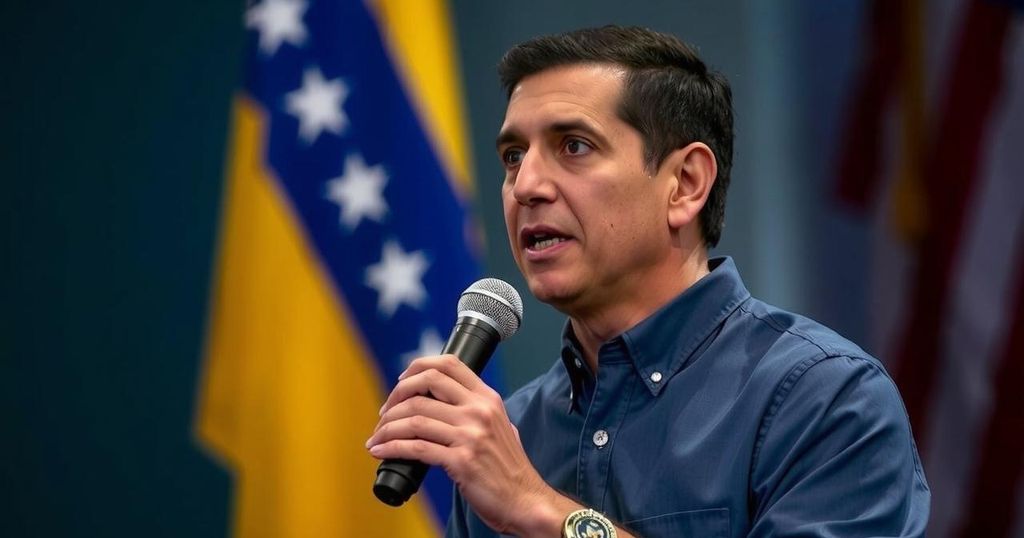U.S. Acknowledges Edmundo Gonzalez as Venezuela’s President-Elect Amid Controversy

The U.S. recognized Edmundo Gonzalez as Venezuela’s “president-elect” months after President Maduro’s disputed election victory. Secretary of State Antony Blinken called for respect for Venezuelan voters’ will, while Gonzalez contended that he received double the votes compared to Maduro. The Venezuelan government has faced international criticism regarding electoral transparency and legitimacy. Colombian President Petro reversed support for the elections, calling them a “mistake,” amidst ongoing tensions in the political landscape.
On a recent Tuesday, the U.S. government recognized Edmundo Gonzalez, the opposition candidate in Venezuela, as the “president-elect” of the nation, several months after President Nicolás Maduro declared victory in the controversial July elections. U.S. Secretary of State Antony Blinken expressed this recognition via a post on social media, urging respect for the Venezuelan populace’s choice. Despite this acknowledgment, the Biden administration has refrained from fully endorsing Gonzalez as president-elect, emphasizing the contentious nature of the election results published by the Venezuelan authorities. The Venezuelan National Electoral Council, comprised predominantly of Maduro supporters, quickly announced him as the winner soon after the polls closed. Notably, they did not provide comprehensive vote counts, leading to questions about electoral integrity. The opposition, however, was able to gather and publish partial voting data from approximately 80% of the voting machines, suggesting that Gonzalez received double the votes of Maduro. In response to the U.S. acknowledgment, Gonzalez stated, “We deeply appreciate the recognition of the sovereign will of all Venezuelans… this gesture honors the desire for change of our people and the civic feat that we carried out together on July 28.” Following the election, Gonzalez sought asylum in Spain after an arrest warrant was issued against him concerning the release of voting tallies. The Venezuelan government has faced critiques from various international bodies, including the United Nations and the Carter Center, regarding the election’s transparency and credibility, although they stopped short of declaring the opposition’s claims as verified. Further complications arose as Colombian President Gustavo Petro, who had initially supported the elections, revised his stance, asserting that the electoral process was not free and calling it a “mistake.” Amid this controversy, Maduro’s administration continues to dismiss external calls for transparency and has instituted a ruling party-controlled audit that ultimately sustained his reelection claim. As Venezuela heads towards the commencement of the next presidential term on January 10, 2024, with Maduro’s government firmly in control, the political landscape remains tumultuous as civil unrest and dissatisfaction among the populace persist.
The situation in Venezuela reflects a prolonged political crisis marked by deep divisions between the ruling party and its opposition. Following the disputed elections of July 2023, international observers, including the United Nations and electoral watchdogs, raised substantial concerns over the legitimacy of the electoral process. The opposition has actively sought to challenge Maduro’s authority, but the administration has maintained its hold through a network of loyalists in key governmental positions. The recognition of opposition leader Edmundo Gonzalez by the United States signifies ongoing international interest in Venezuelan democracy, yet it also highlights the complexities of foreign involvement in domestic political conflicts.
The recent U.S. recognition of Edmundo Gonzalez as the president-elect of Venezuela underscores the tensions surrounding the legitimacy of Maduro’s administration in the wake of disputed elections. Despite calls for electoral transparency and respect for the public’s will, the situation remains fraught with political challenges and international scrutiny. As Venezuela approaches a new presidential term, the unresolved issues surrounding the election and governance could intensify domestic instability and complicate international relations.
Original Source: www.voanews.com







